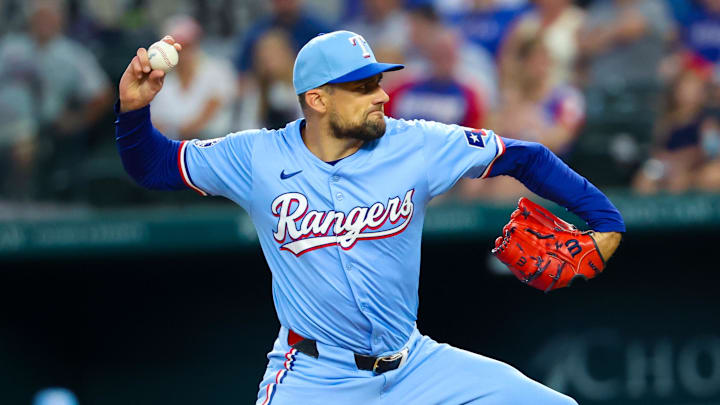How Did They Do? Texas Rangers Gradebook After Three MLB Winter Meetings Moves

In this story:
The Texas Rangers had specific targets going into the MLB winter meetings in Dallas this week, and you can make the argument that they hit all of them.
The Rangers needed to bolster their starting rotation and accomplished that by re-signing Nathan Eovaldi. They needed some more pop in their lineup and they did it with the trade to bring in Jake Burger. Texas needed to start rebuilding its bullpen and they did so by signing reliever Jacob Webb.
Overall, how did the Rangers do? Let's explore and grade everything out.
Nathan Eovaldi
Eovaldi was the Rangers top free-agent target after he triggered the $20 million vesting option in his contract and opted for free agency. He and the Rangers agreed to a three-year, $75 million deal. It's good for both parties.
Eovaldi will make $5 million more in 2025 than he would have with the vesting option and gets security for 2026 and 2027. A three-year, $75 million deal for a pitcher of his caliber is perfect, financially speaking, especially considering he’ll be 37 years old when the deal ends.
The Rangers get a proven No. 2 to go with Jacob deGrom who can pitch like a No. 1 when he’s really on. He’s a workhorse, he’s reliable and avoids major injuries. He rarely has a bad game.
He’s a leader in the clubhouse and with young pitchers like Kumar Rocker and Jack Leiter coming, that’s invaluable.
Given the local TV situation, a push for hot free agents Corbin Burnes or Blake Snell was unlikely to happen. This was the best-case scenario for Texas. Both sides win.
Grade: A
Jake Burger
The Rangers lagged in offense last year and adding Burger brings in a player who has 63 home runs in the past two seasons, mostly with Miami. He can play first and third base, which means he can capably back up Nathaniel Lowe and Josh Jung, respectively.
But trading for Burger also represents a philosophical change. The Rangers have used the designated hitter role to give veterans a day off from the field. Burger’s bat demands he be in the lineup. That’s the only spot to put him, barring injuries to Lowe or Jung.
He’s under 30, hasn’t hit arbitration yet and the Rangers have control of him for at least four more years. The cost to get him was considerable — three top 30 prospects, according to MLB Pipeline. But none of them will be ready until at least 2026. Burger will give the Rangers production right away.
Grade: B
Jacob Webb
The Baltimore Orioles non-tendered the right-hander last month, which was curious. Webb was 2-5 last year, but he had a 3.02 ERA in 60 appearances, saved two games and struck out 57 with 28 walks.
His walk rate of 4.2 per nine innings may have scared off the O’s, but he strikes out nine hitters per nine innings and has a World Series ring from his days in Atlanta. He knows how to pitch in the postseason.
A $1.2 million, one-year deal for a reliever like Webb is a team-friendly deal that allows him to out-pitch the money and get a new deal next offseason, sort of like Kirby Yates did with Texas in 2024.
Grade: B

Matthew Postins is an award-winning sports journalist who covers Major League Baseball for OnSI. He also covers the Big 12 Conference for Heartland College Sports.
Follow postinspostcard